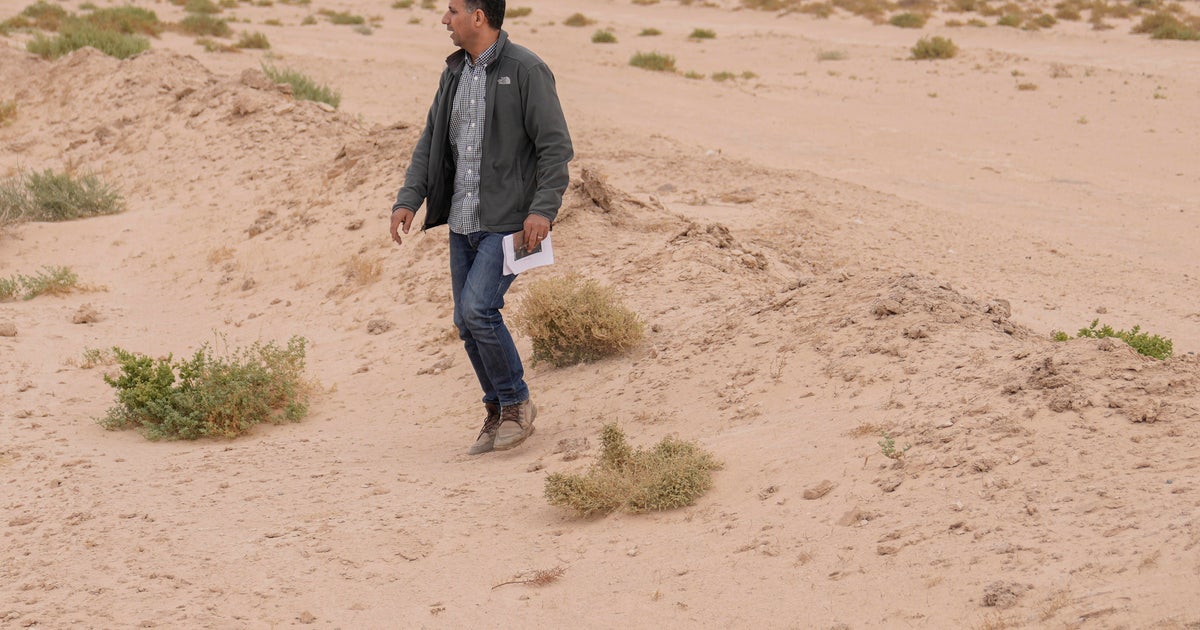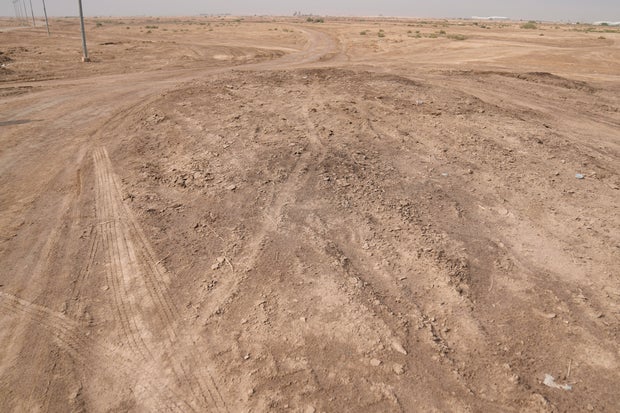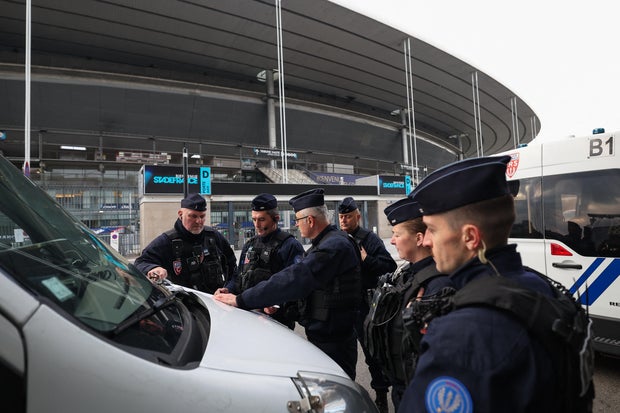CBS News
Site of ancient, key battle in Iraq found by archeologists using spy satellite images

Beirut — Declassified 1970s-era U.S. spy satellite imagery has led a British-Iraqi archeological team to what they believe is the site of a seventh-century battle that became decisive in the spread of Islam throughout the region.
The Battle of al-Qadisiyah was fought in Mesopotamia — in present-day Iraq — in the A.D. 630s between Arab Muslims and the army of the Sassanid Persian dynasty during a period of Muslim expansion. The Arab army prevailed and continued on its march into Persia, now Iran.
A joint team of archeologists from the U.K.’s Durham University and the University of Al-Qadisiyah stumbled across the site while undertaking a remote sensing survey to map the Darb Zubaydah, a pilgrimage route from Iraq’s Kufa to Mecca in Saudi Arabia built more than 1,000 years ago. The findings were published Tuesday in the journal Antiquity.
Hadi Mizban / AP
While mapping the route, the team noticed that a site some 20 miles south of Kufa in Iraq’s southern Najaf province — a desert area with scattered plots of agricultural land — had features that closely matched the description of the al-Qadisiyah battle site described in historic texts.
William Deadman, a specialist in archaeological remote sensing at Durham University, said the Cold War era satellite images are commonly used tools by archeologists working in the Middle East because the older images often show features that have been destroyed or altered and wouldn’t show up on present-day satellite images.
Hadi Mizban / AP
“The Middle East has developed so much in the last 50 years, both agricultural expansion and urban expansion,” he said. Some of the distinguishing features at the al-Qadisiyah site, such as a distinctive trench, were “much more pristine and clear” in the 1970s images, he said.
A survey on the ground confirmed the findings and convinced the team that they had correctly identified the site.
The key features were a deep trench, two fortresses and an ancient river that was reportedly once forded by elephant-mounted Persian troops, said Jaafar Jotheri, a professor of archeology at the University of Al-Qadisiyah who’s part of the team that made the discovery. The survey team also found pottery shards consistent with the time period when the battle took place.
A revealing, well-known battle
Jotheri said Iraqis of his generation, who grew up under the rule of Saddam Hussein, were all familiar with the battle in minute detail, down to the names of the generals on both sides.
The battle at the time had political connotations — Iraq was engaged in a devastating war with Iran through much of the 1980s. Saddam pointed to the Battle of Qadisiyah as a harbinger of victory for Iraq.
Like most children growing up in that era, Jotheri said he’d watched a popular movie about the battle multiple times as it was on regular rotation on television.
In the post-Saddam era, al-Qadisiyah has become something of a political litmus test. Iraqis’ views of the battle vary depending on their feelings toward Iran, which has expanded its influence in the country since the 2003 US-led invasion of Iraq that toppled Saddam.
“There is some political and religious context in this battle because now, of course, we have religious differences, ethnic differences, political differences in Iraq and we read or we view everything based on our … differences,” Jotheri said. But he added, “We all agree that it is a very important battle, a decisive one, and we all know about it.”
Discovery was part of a regional trend
The team plans to begin excavations at the site in the coming year, Jotheri said.
The discovery comes as part of a broader project launched in 2015 to document endangered archaeological sites in the region.
It also comes at the time of a resurgence of archeology in Iraq, a country often referred to as the “cradle of civilization,” but where archeological exploration has been stunted by decades of conflict that halted excavations and led to the looting of tens of thousands of artifacts.
In recent years, the digs have returned and thousands of stolen artifacts have been repatriated.
CBS News
Exclusive discounts from CBS Mornings Deals

Watch CBS News
Be the first to know
Get browser notifications for breaking news, live events, and exclusive reporting.
CBS News
Paris on alert as Israel’s soccer team set to play after antisemitic attacks on Israeli fans in Amsterdam

Paris — Security forces were on high alert Thursday in Paris ahead of a soccer match between France’s national soccer team and the visiting Israeli side. Pro-Palestinian demonstrators held protests in the city Wednesday night, and there has been fear of a possible repeat of last week’s violence and antisemitic attacks against Israeli soccer fans in Amsterdam.
Thousands of protesters marched Wednesday night to voice their opposition to Israel’s ongoing war in the Gaza Strip against Hamas, including 46-year-old Nacim Bordiah, who said France “should be boycotting the match.”
“We stopped Russia and South Africa from playing in the Olympics,” he said, referring to Russia’s ongoing ban from the global sports event due to the war in Ukraine and the South Africans being barred during the reign of its white apartheid regime. “Why not Israel now?”
Ameer Alhalbi/Anadolu/Getty
The march was peaceful, but tension was running high on the heels of antisemitic violence last week on the streets of Amsterdam following a game between Israeli and Dutch teams.
Among the Israeli fans who came to support Maccabi Tel Aviv in Amsterdam, there were some who marched through the streets before the game chanting “death to Arabs” and tore down a Palestinian flag. But after the match, mobs cornered Israeli fans and bystanders, beating and kicking them and throwing one into a canal.
Amsterdam Mayor Femke Halsema condemned the violence, saying in its wake that “Jewish Israeli supporters were hunted down and attacked via anti-Semitic calls on social media and on the streets.”
Dutch Prime Minister Dick Schoof described the violence as a “terrible antisemitic attack” and declared himself “deeply ashamed” for the country’s capital city, while his Israeli and American counterparts, Prime Minister Benjamin Netanyahu and President Biden, also voiced disgust and horror at the attacks targeting Jews.
Speaking Tuesday, Mayor Halsema said “a more complete picture” had emerged of the clashes that gripped Amsterdam last week, “and all sorts of terrible things happened,” but she stressed that it “in no way negates” that a call had been issued in her city for a “hunt for Jews.”
Clashes have persisted since then, despite a temporary ban on demonstrations in Amsterdam, with police breaking up one protest that sought to defy the ban as recently as Wednesday evening. A train in Amsterdam was also attacked, with one man shouting, “cancer Jew!”
Ameer Alhalbi/Anadolu/Getty
In Paris, only about a quarter of the available tickets for Thursday night’s match had been sold, French Interior Minister Bruno Retailleau said Wednesday, and only about 150 Israel supporters were expected to attend.
But French authorities have warned “there’s no such thing as zero risk.”
They’ve deployed about 4,000 police and other security forces to patrol around the city and the Stade-de-France, the national stadium where the match was being held in a northern suburb of Paris.
Tucker Reals and
contributed to this report.
CBS News
Concern in fashion industry over model sizes creating unrealistic standards

Watch CBS News
Be the first to know
Get browser notifications for breaking news, live events, and exclusive reporting.












